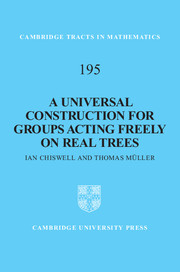Book contents
- Frontmatter
- Contents
- Preface
- 1 Introduction
- 2 The group ℛF(G)
- 3 The ℝ-tree XG associated with ℛF(G)
- 4 Free ℝ-tree actions and universality
- 5 Exponent sums
- 6 Functoriality
- 7 Conjugacy of hyperbolic elements
- 8 The centralisers of hyperbolic elements
- 9 Test functions: basic theory and first applications
- 10 Test functions: existence theorem and further applications
- 11 A generalisation to groupoids
- Appendix A The basics of Λ-trees
- Appendix B Some open problems
- References
- Index
Preface
Published online by Cambridge University Press: 05 November 2012
- Frontmatter
- Contents
- Preface
- 1 Introduction
- 2 The group ℛF(G)
- 3 The ℝ-tree XG associated with ℛF(G)
- 4 Free ℝ-tree actions and universality
- 5 Exponent sums
- 6 Functoriality
- 7 Conjugacy of hyperbolic elements
- 8 The centralisers of hyperbolic elements
- 9 Test functions: basic theory and first applications
- 10 Test functions: existence theorem and further applications
- 11 A generalisation to groupoids
- Appendix A The basics of Λ-trees
- Appendix B Some open problems
- References
- Index
Summary
In summer 2004 V. N. Remeslennikov, during a visit to Queen Mary and West- field College, gave a series of three talks in which he outlined the construction of a class of groups ℛF(G), starting from the collection of (set-theoretic) functions f : [0, α] → G, where α is any non-negative real number and G is a given (discrete) group. Apparently, his main motivation was to imitate the construction of free groups in a continuous setting. He indicated that these new groups would have natural ℝ-tree actions associated with them, and he pointed out that it might be possible to study the centraliser of a hyperbolic element f in terms of (suitably defined) periods of f. However, no proofs were given.
Nevertheless, the picture emerging was felt to be interesting; the authors set out to try to fill in missing proofs, at first with the modest aim of establishing that the construction really produced groups. This task alone turned out to be rather difficult, leading to the development of a substantial body of cancellation theory (as given in Chapter 2 of the present book) before the actual proof that ‘reduced multiplication’ was associative could be given. By the time this task was accomplished (more than half a year later), the authors were already absorbed in what turned out to be a difficult but ultimately rewarding theory.
Information
- Type
- Chapter
- Information
- A Universal Construction for Groups Acting Freely on Real Trees , pp. xii - xivPublisher: Cambridge University PressPrint publication year: 2012
